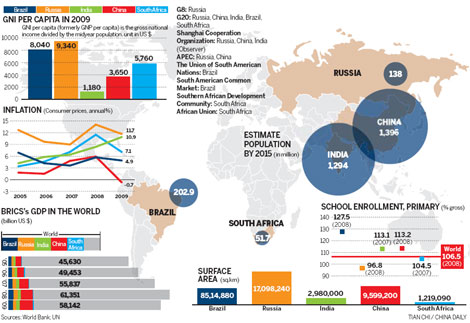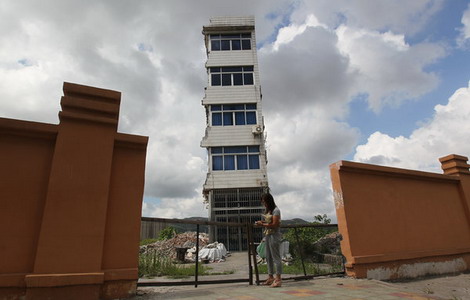

Top emerging economies meet to discuss forging bigger world role, Wu Jiao reports from Beijing.
Leaders of the world's five top emerging economies gather in China on Thursday to discuss improving coordination to gain a bigger say in global economic issues.
The BRICS (Brazil, Russia, India, China and South Africa) will meet in the resort city of Sanya, in southern China's Hainan province, for their third annual summit, with South Africa taking part for the first time.

The one-day meeting will mainly focus on economic issues, including enhancing coordination on topics such as reform of the international monetary system, halting commodity price fluctuation, combating climate change and promoting sustainable development, according to briefings given by the Foreign Ministry, which hosts the event.
Global hotspots, including critical situations in some African countries, will also be discussed.
Recognizing BRICS' increasingly important role in the world economy, analysts said the group would remain a major engine of global economic growth in the next decade.
It will also boost cooperation between developing and developed countries and raise the bargaining power of emerging economies.
The combined GDP of the BRICS nations accounted for 18 percent of the global total in 2010.
But, according to research by the China Center for International Economic Exchanges, this figure will grow to a staggering 47 percent by 2030.
According to Zheng Xinli, the center's vice-president, the group will remain the locomotive of world economic development, as rapid urbanization within the BRICS countries provides huge potential for growth.
For instance, rapid urbanization in China has helped to sustain its double-digit growth during the past decade.
"Consequently, the expanding market in the five BRICS countries will boost trade between its members, and increase the exports of countries in Africa, Latin America and Southeast Asia," Zheng said.
To avoid possible trade disputes, Ravni Thakur Banan, associate professor of the Department of East Asian Studies at Delhi University, advised that the BRICS members should sign a CEPA (closer economic partnership agreement) in order to enhance trade.
Experts said that the global impact of BRICS lies in its role as a bridge between developed and developing countries, with growing demand in the latter requiring capital and technology from the former.
This cooperation will play a primary role in promoting economic recovery in developed countries, said Zheng.
According to the International Monetary Fund (IMF), between 2011 and 2015, emerging economies, particularly the BRICS, will account for half of global demand.
The IMF estimates that China and India will grow at annual average rates of 9.5 percent and 8.2 percent between 2011 and 2015, while Russia and Brazil will grow by more than 4 percent annually, meaning that global economic development will further rely on emerging economies.
"The BRICS will continue to play a role as the economic engine of the world as they boast huge potential and a growing middle-class with a strong appetite for consumption," said Chen Fengying, director of world economic studies at the China Institutes of Contemporary International Relations.
Along with their economic clout, Jin Canrong, deputy dean of the School of International Studies at Renmin University at China, said that the BRICS would greatly enhance the influence of emerging countries in global economic governance.
According to Vishnu Prakash, joint secretary and spokesman of India's Ministry of External Affairs, the grouping has already been able to emerge as an important voice.
"All of the BRICS countries are members of the UN, of which two are permanent (members of the Security Council). It is a process which will evolve with the passage of time. It has emerged as a forum for policy coordination and the exchange of ideas," he was quoted as saying by the Indian newspaper Business Standard.
But experts also warned of challenges to the smooth development of emerging economies, including the sluggish economy in developed countries.
The ongoing Middle East crisis, and the surging price of commodities, such as crude oil, grain and minerals, pose risks to the development of emerging economies, said Chen.
Zheng from the China Center for International Economic Exchanges further warned that the income gap and inadequate social welfare systems may also slow down the BRICS' development.
BRICS is currently a loosely connected economic forum. Sometimes, the member countries have no coordinated stance on major world issues.
To get BRICS to play a bigger and more unified role, it definitely needs more institutionalization, said Jin.
As BRICS consists of countries with different political systems and their opinions may differ on certain topics, Jin said they cooperate in some sectors which are less sensitive in order to avoid sudden setbacks. These may include public health and climate change.
Yang Jiemian, president of Shanghai Institutes for International Studies, said the BRICS should increase their coordination in the framework of large international meetings such as the G20 and the UN General Assembly.
Yang also advised that the BRICS should build a dispute and crisis management mechanism to cope with possible international frictions.







